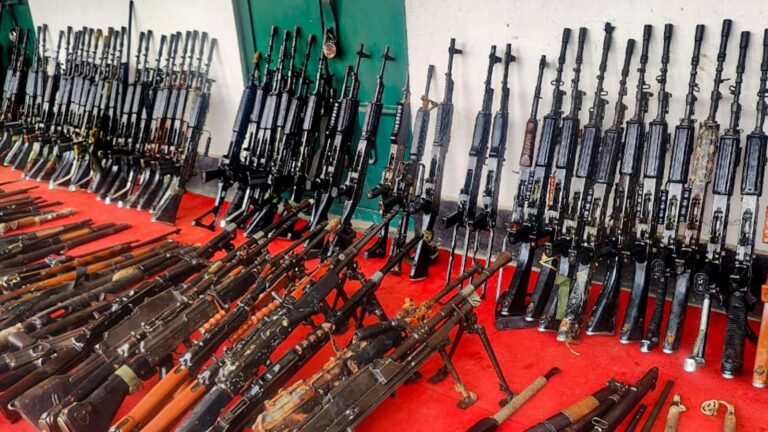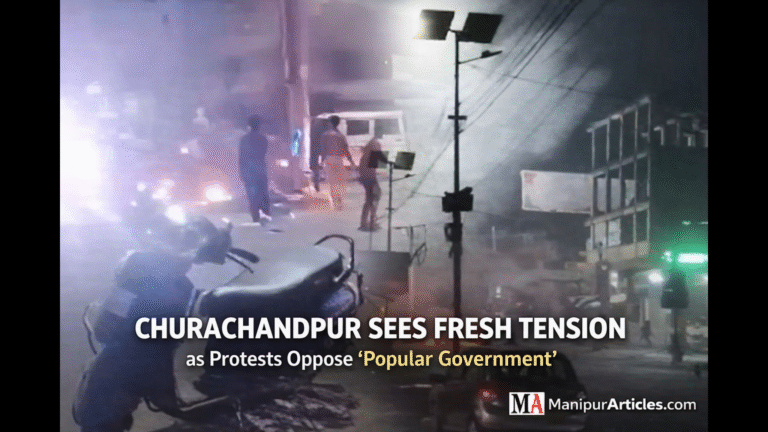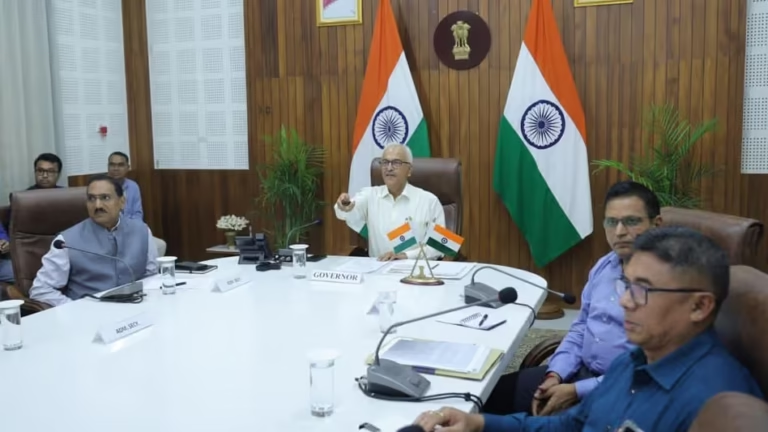Manipur Police Arrest Seven KCP (PWG) Militants, Seize Weapons and Explosives
Summary of the News
In a significant crackdown on insurgency, the Manipur Police arrested seven members of the Kanglei Communist Party (People’s War Group) [KCP (PWG)] during a well-coordinated operation in Kakching district on December 16, 2024. Acting on precise intelligence, the authorities seized a cache of weapons, explosives, and communication devices from the group. This operation follows heightened tensions in the region after the recent killing of two migrant workers, showcasing the state’s resolve to counter militant threats and restore order.
Unraveling the Arrest of KCP (PWG) Militants in Manipur
Manipur, known for its scenic landscapes and vibrant culture, is no stranger to the shadows of insurgency. The recent arrest of seven KCP (PWG) militants marks a decisive step forward in the state’s ongoing battle against organized militant activities. Let’s break down this development and its implications.
The Operation: A Success Rooted in Precision
When it comes to fighting insurgency, timing and intelligence are everything. On December 16, 2024, the Manipur Police, acting on credible information, launched a high-stakes operation in Kakching district. It all started with the arrest of Irengbam Rameshwar Singh, a senior operative of the KCP (PWG), in Kakching Lamkhai. This breakthrough led the police to a hideout in Kakching Mamang Ching Laipham Loknung, where six other militants were apprehended.
The arrested individuals include:
- Elangbam Herojit Singh (40 years)
- Heikrujam Prem (28 years)
- Okram Arundatta (30 years)
- Senjam Rebingson (27 years)
- Okram Amarjit (31 years)
- Aribam Ghanendrajit Sharma (25 years)
During the operation, the police confiscated a significant arsenal of weapons and explosives. Here’s what they found:
- Pistols, including a 7.65mm and country-made variants
- A sniper rifle and other firearms
- Three HE grenades with detonators
- A cache of ammunition
- Communication devices like Baofeng handsets
- Multiple mobile phones and an unregistered vehicle
The success of this operation underscores the effectiveness of intelligence-driven policing in combating insurgency.
Who is the Kanglei Communist Party (PWG)?
Ever wondered who these groups are and what motivates them? The Kanglei Communist Party (People’s War Group), often abbreviated as KCP (PWG), is one of several insurgent factions in Manipur. They’re known for their separatist ideology, aiming for an independent socialist state. Their modus operandi includes bombings, extortion, and targeted attacks, which have long destabilized the region.
But why do these groups exist? It boils down to a mix of historical grievances, socio-economic challenges, and political discontent. The KCP (PWG) operates in the shadows, but their actions leave a ripple effect on the lives of ordinary citizens, disrupting the region’s peace and progress.
Context: The Killings That Shook Kakching
The operation to apprehend these militants came just days after the tragic killing of two migrant workers from Bihar on December 14, 2024. The victims, Roshan Kumar (17) and Arjun Kumar (18), were shot while working on a road construction project in Kakching. These brutal murders sparked outrage and intensified security efforts in the district.
While it’s unclear whether the arrested KCP (PWG) militants were directly involved in the killings, their capture is seen as a significant move in addressing the broader security concerns in the state. The incident highlights the increasing vulnerability of migrant workers in insurgency-affected regions and the urgent need for robust security measures.
Manipur’s Tryst with Insurgency: A Broader Perspective
Insurgency in Manipur isn’t a new phenomenon. For decades, the state has been a battleground for various militant groups, each with its own agenda. The KCP (PWG) is just one of many factions operating in the region. What makes the situation complex is Manipur’s geographical and socio-political context.
Challenges Amplified by Geography
Manipur’s proximity to Myanmar and its porous borders make it a hotspot for smuggling, arms trafficking, and militant movement. Add to this the region’s difficult terrain, and you have a recipe for prolonged insurgency.
Impact on Daily Life
For locals, insurgency is more than just a headline—it’s a daily reality. Extortion, strikes, and violence disrupt normal life, while fear looms large over communities.
Economic Repercussions
Businesses hesitate to invest, infrastructure projects face delays, and the overall economy takes a hit. Migrant workers, often targeted by militants, bear the brunt of this instability.
Government Response: Fighting Back with Strategy
So, how is the government addressing this? The answer lies in a mix of hard and soft approaches:
Tough on Militants
Operations like the one in Kakching are part of a broader strategy to dismantle insurgent networks. These efforts involve coordination between state police, paramilitary forces, and intelligence agencies.
Engaging with Rebels
On the softer side, the government has initiated peace talks with various insurgent groups, offering them a chance to reintegrate into society. Rehabilitation programs aim to provide a path away from violence.
Boosting Development
Economic development is another weapon against insurgency. By investing in infrastructure and creating job opportunities, the government hopes to address the root causes of discontent.
The Way Forward: A Glimmer of Hope
While challenges remain, operations like the recent one in Kakching offer hope. They demonstrate that with the right strategy, it’s possible to combat insurgency effectively. However, lasting peace will require a sustained effort, not just by the government but also by local communities and other stakeholders.
FAQs
1. Who are the KCP (PWG) militants?
The Kanglei Communist Party (People’s War Group) [KCP (PWG)] is a militant group in Manipur aiming for an independent socialist state. They engage in activities like extortion, bombings, and targeted killings.
2. Why was the Kakching operation significant?
The operation led to the arrest of seven KCP (PWG) militants and the seizure of a large cache of weapons, marking a significant step in curbing insurgency in the region.
3. What challenges does Manipur face due to insurgency?
Insurgency affects daily life, disrupts economic activities, and creates social instability. The state’s porous borders with Myanmar further complicate security issues.
4. How is the government addressing the insurgency?
The government employs a dual approach: conducting operations to dismantle militant groups and initiating peace talks to reintegrate former rebels into society.
5. What was the connection between the arrests and the recent migrant killings?
While the direct involvement of the arrested militants in the killings is unconfirmed, their apprehension is part of broader efforts to enhance security in the region.



